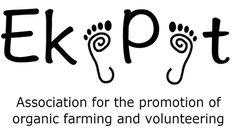|
Nowadays, it’s easy to forget that vegetables don’t grow at the same time, and it’s even easier to forget the massive efforts required to get a freshly harvested tomato on your plate during the winter.
When I would talk about food seasonality with my father in Belgium, he would only talk about bad memories of him having to eat the same thing from his grandparent’s garden for weeks in his childhood at the countryside. Then I worked at my brother’s restaurant that would only work with seasonal products while having to change their menu every two weeks, and really realized what it means when he had to figure out how to cook the same turnips, carrots, potatoes and celeriac in various and delicious ways for a few months. But he managed to, and every time it was a success. Now, since I got here at the Ekopot farm, I’ve lived through more than a month of red beet at virtually every meal, and I could go on till they disappear from the cellar. Obviously, we don’t feed only on red beet, but at the end of winter season, it’s one the only things that we have in – so we believe – near infinite amounts. The farm is 80% self-sufficient in food, and that includes homemade canned products that we use in the winter when fresh products go fewer. So we do with what we have. Red beet basically flows through my veins now, and what amazes me is that not once I – or my body – complained about it. The thing is that I never could dream of doing that with supermarkets’ red beet. Thus why I couldn’t ask that from my fellow citizens. The reason I can do it is that I have access to sweet and tasteful products, grown with care and expertise by the Turinek and their volunteers. Yet, food seasonality matters on many levels. Environmentally, having all sorts of products available at all times of year is a logistic and ecological aberration, yet is the norm and the goal that global food trade purposes to achieve. Besides, observing food seasonality is a great way to reconnect with nature and its rythms, going from the slow and bittersweet winter to the colorful and lush summer vegetables, as well as a great stimulus to get creative in the kitchen, as constraints enable creativity much more than unlimited access to any product at any time. That is why we can’t strive for more sustainable food consumption without alternative, local and organic food supply chains, that can provide quality products throughout all the year, that will make you yearn for every season, because you will know that you will reunite with those products that have become vividly associated with these periods of time in your memories. That’s how food becomes meaningful again, and stops to be a bland, given and random consumable like any other.
0 Comments
Leave a Reply. |
AuthorWrite something about yourself. No need to be fancy, just an overview. Archives
December 2020
Categories |
